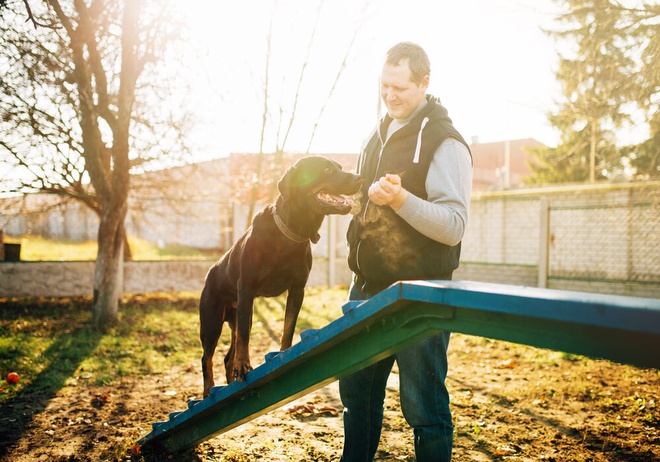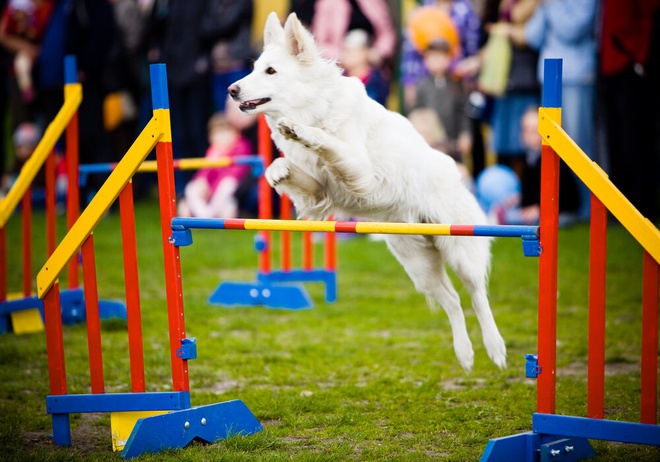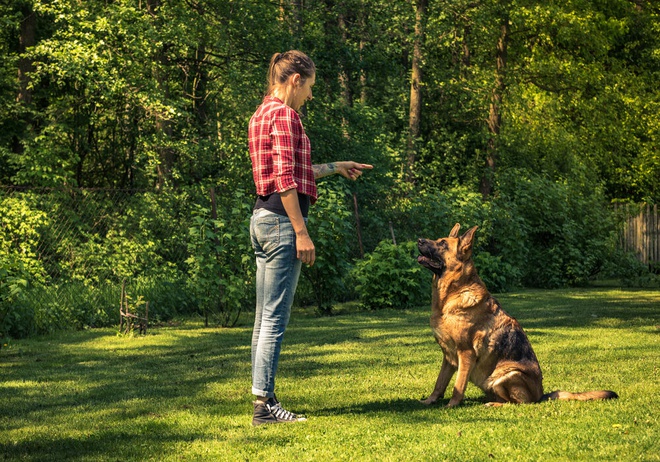How to choose a good pet trainer?
Choosing the right dog trainer will be crucial to the success of your dog's training. We explain what you need to know and share with you the advice of a professional. Follow the guide!

Reading time : 7 min
Living with a newly adopted puppy is always particularly exciting. The uniquely mischievous nature of puppies promises many moments of sharing, playing, and laughing. However, it is important to think about the puppy's education to ensure their happiness. Indeed, living with a trained dog is synonymous with serenity, but contrary to what many people think, dog training is not all sunshine and rainbows.
While it may seem simple to start training a puppy and teach them to be clean, for example, long-term obedience or the right attitudes to adopt can be far less easy. With this in mind, it may be necessary or even beneficial to call on the services of a dog trainer to learn how to train your puppy with the right attitude. After all, dog training books only give theoretical information and do not offer the interactivity that can really make a difference. Vets can also advise dog owners to consult a dog trainer in case of inappropriate behaviour.
TOPICS
Why use a dog trainer?

Calling in a dog trainer does not mean that the owner is incompetent, but rather is a way of ensuring that the right things are done, that the right attitudes are adopted concerning the puppy or dog, and that this is done right from the start.
Because in reality, dog trainers intervene in the training of the dog, but they are also precious advisers and guides for the dog owner. The dog trainer's intervention can take place in the dog training centre, at your home if the difficulties are related to the place of residence, or in any other place that may generate inappropriate behaviour in the dog, such as the street or the park.
Why is it safer to use a dog trainer?
There can be many reasons to consult a dog trainer. It could be the nature of the dog, their character, the dog's behaviour, an uncontrolled fear related to a particular situation or simply the desire not to make mistakes in the training of one's pet.
All inappropriate behaviour is there for a reason. Whether this bad behaviour is the result of experience or learning, it is not always easy for a dog owner to identify the cause and remedy it. It is also worthwhile to call in a dog trainer for personalised advice as information you can find on the internet can often be wide and generic and what works for one dog might not work for yours.
What is the role of a dog trainer?
The puppy socialised by their mother has received all the social and behavioural training associated with their species. In addition, the responsible breeder has subjected the puppy to a series of situations that they will be confronted with later on to facilitate their adaptation to society. The only thing left for the puppy to learn is the structure and rules that will allow them to fully integrate and live harmoniously with humans. But puppy training cannot be improvised. If owners are not completely comfortable, the dog trainer can guide them and explain how to train a puppy.
More and more puppy schools are opening in dog training centres where socialisation, obedience, recall training, barking control, walking with or without a leash, etc. are taught. Dog training games always involve the owner, whose presence is required during the training sessions to fully integrate into the puppy training process. A fun way to learn how to train your dog.
Dog training really is about games, such as clicker training, because it is about positive dog training. The coercive method has almost completely disappeared, at least among professionals.
What is the role of a dog trainer in rehabilitation?
A dog taken in from a shelter, for example, may have a more or less traumatic past. The various traumas suffered through abandonment, violence, indifference or simply the absence of training can be the cause of inappropriate behaviour or generate regression. It can be useful and important to involve a dog trainer as part of rehabilitation.
The dog trainer will then intervene to re-teach the dog basic commands. But their role can also consist of accompanying owners in their dog's education for the learning of recall, obedience, walking on or off lead or teaching them to control barking. Just as the dog trainer can introduce an initiation to agility or any other dog sport to work on developing complicity and reinforcing the trust and the relationship that links owners to their dog.
What are the skills of a dog trainer?
The range of skills of a dog trainer can be extremely wide. Some can even offer services that are not necessarily self-evident, such as teaching your canine friend to refuse food from a stranger for their own safety or offering training in biting or tracking.
Dog training courses range from walks in small groups, socialisation, recall or heel command, taught by dog training instructor to training hunting dogs, done by dog trainers. These courses last between 1 and 4 weeks and include training, breaking-in and retrieving. When the dog returns, they are ready to go hunting with their owner.
How much does a dog trainer cost?
Individual lessons can be taken by the hour or as a package. Prices can vary between $30 and $50 per hour with a non-qualified instructor. Individual lessons with a qualified dog trainer cost between $45 and $120 per hour. The cost of travel for individual lessons at home, on the street or in the park may or may not be included.
Finally, the price of a session can be much higher if it is a behavioural problem that requires the intervention of a dog behaviourist.
What makes a dog trainer good?

The choice of a dog trainer who will help you train your puppy or dog is a point that should not be overlooked. It is very important that the owner can rely entirely on the dog trainer. Trust is therefore essential. But what should you consider when choosing a dog trainer?
Dog trainer qualifications
It may seem important to check the qualifications of the professional. The qualifications dog trainers certify that they mastered the methods of dog training and that they have all the knowledge relating to the specificities of each breed of dog. They will therefore be able to adapt their training to the breed (guard dog, sheepdog, companion dog, etc.) and advise owners on dog behaviour, diet, and legislation.
The different dog training methods used
It is imperative to ensure that the dog trainer uses the positive reinforcement method or cooperative care. In other words, that they rely on the dog's full cooperation and do not use any coercion. That said, it is becoming increasingly difficult, if not impossible with the current advances in animal welfare, to find a dog trainer who still uses the coercive method. If the dog trainer offers to use an electric shock collar or spiked collar from the get-go, flee!
Personal feeling
How the owner feels about a dog trainer is also an important criterion. The relationship between the dog trainer and the dog must be smooth, but it is also essential that the owner has total trust in the trainer. The dog trainer plays a teaching role but also acts as a relay between the dog and the owner and the method used should be in line with the owner’s values. In case of doubt, the owner should move on and find another dog trainer who is more in line with their expectations.
The job is also not just for men as many female dog trainers are just as competent as their male counterparts. On this point, the choice is ultimately very personal.
10 questions to test your pet training knowledge
Do you know everything there is to know about training dogs and cats? Answer our 10 questions to find out!
What about cat trainers?

In cat training, we prefer using the term of a cat behaviourist rather than a cat trainer. They are neither a veterinarian nor even a trainer; even if it is possible to find a veterinary behaviourist.
The cat behaviourist intervenes mainly to solve behavioural problems in cats that can make cohabitation difficult. They rely on ethology, the study of animal behaviour, in this case, feline behaviour, to identify the link between inappropriate behaviour and a specific event in the cat's life.
Reasons for a cat's behaviour problems
Scratching on furniture, uncleanliness and aggression are all bad behaviours of cats that make living with them very difficult. Obsession with food or an overly fearful cat are also behaviours that need to be corrected for their physical and mental health.
These feline behaviours may be due to poor socialisation or may be the result of a significant event: the birth of a child, a move, the arrival of another animal, etc. This is called adaptive behaviour.
The role of the cat behaviourist
The role of the behaviourist is to examine the life of the cat and their owner in detail. They will dissect the cat's history, territory, rituals and habits in the home and any changes that have occurred.
Following this assessment, the feline behaviourist dog will propose solutions that aim to modify the cat's behaviour and, for the owners, to find a peaceful life alongside their favourite feline.
Conclusion
Whether they are independent or work in a dog training school, dog trainers are true professionals who have all the skills to train a dog and to teach an owner how to train their dog. Their knowledge of dog ethology, dog training technique and pedagogy often work wonders.
The interaction generated during dog training classes is beneficial for both the dog and the owner. These dog training games are not only a special time but also an opportunity to strengthen the relationship. It is not uncommon for owners to turn to agility or other dog sports after dog training, thus prolonging these moments of complicity.
Continue reading our guide
This article is a part of a complete guide on the subject. Do not miss the next chapters.
Do you know everything there is to know about training pets?
Answer our 10 questions to test your pet training knowledge.
